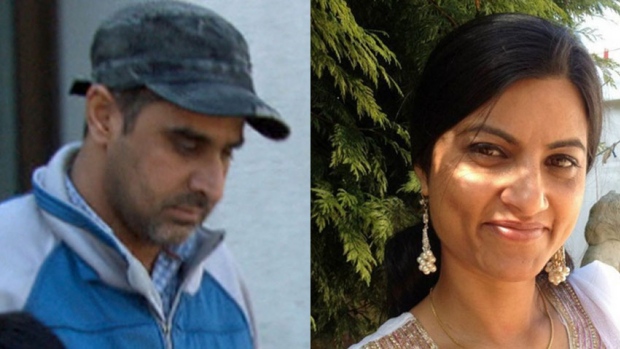Bhupinderpal Gill, victim’s husband, and Gurpreet Ronald spoke for dozens of hours before killing
By Laurie Fagan, CBC News
The husband of a woman who was found beaten and stabbed to death in their home in 2014 “hated his wife” and didn’t consider divorce an option, the Crown alleged during opening statements on the first day of a high-profile murder trial in Ottawa.
Bhupinderpal Gill, the husband, and Gurpreet Ronald, a neighbour, are each charged with first-degree murder in the death of Jagtar Gill and have pleaded not guilty. Both worked as bus drivers for OC Transpo.
The two accused are being tried together, but each have their own defence lawyers.
Crown prosecutor Jason Neubauer told Ontario Superior Court that Ronald and Bhupinderpal Gill were involved in a long-standing affair of a year and a half and that they conspired to kill Jagtar Gill, whom Ronald hated as well.
Phone records show the co-accused spoke for about 48 hours during hundreds of calls in the 28 days leading up to the killing and met each other repeatedly, Neubauer told court.
Gill ‘most vulnerable’ on day of killing
On the day she was killed, Neubauer said, Gill was at her “most vulnerable” following abdominal surgery the day before.
Jagtar Gill, 43, was found dead in her home in January 2014. The Crown contends that her husband and his lover “hated” her and conspired to kill her. (Courtesy of Gill’s family)
Her husband and daughter left the home that morning to buy anniversary presents, and that is when, the Crown alleges, Ronald entered the home and bludgeoned and stabbed a weakened Gill.
It was noted that wounds on Gill’s forearms and hands indicated she tried to defend herself from the attack.
On the day of the killing, phone records show the two accused spoke four times and met up after Gill was dead at a nearby grocery store, where they spoke briefly and left in separate vehicles.
Neubauer said the Gills’ teenage daughter was the first to make the “shocking and gruesome” discovery of a “particularly brutal killing” when she and her father returned to their Barrhaven home.
Ronald changed story to police, Crown says
Ronald initially told police she didn’t know the Gills very well, but that she thought they had a good marriage. The next day she changed her story, telling police she went shopping with Jagtar Gill and cut her hair, and that she was close with Gill’s husband, Neubauer said.
Blood from Ronald and Jagtar Gill was found on a knife discovered in a wooded area by a National Capital Commission worker in the spring of 2014, several months after Jagtar Gill’s death in January, Neubauer told court.
When first interviewed by police, Bhupinderpal Gill told them he and Ronald were just friends, and “he had no idea who would kill his wife.” He also told them he wiped off blood from knives next to his wife’s body because he “was scared.”
The Crown argued Ronald’s blood was found on the finger portion torn from a blue latex glove found next to Gill’s body.
Police set up surveillance video
Neubauer told the court Gill hid the bloody weightlifting bar used to bludgeon his wife in a box in the basement. Police found the bar while searching the house after the killing and took it as evidence.
Police then placed a replica bar with blood on it in the box and set up a concealed video camera next to it.
Bhupinderpal Gill is pictured in an earlier court appearance. (Sketch by Laurie Foster-Macleod/CBC)
That surveillance video captured Gill removing the bar from the basement. Police then followed him to a wooded area near Cedarview Road and saw him toss the bar, which they later recovered.
In April, a short time before his arrest, Bhupinderpal Gill admitted to police he and Ronald were having an affair.
Jagtar Gill’s sister, Harjinder Singh, was also in the courtroom Friday, and wiped tears from her eyes as the Crown outlined the details of the killing.
Trial delayed by lengthy jury selection
The trial was set to begin earlier this week, but three female jurors asked to be excused from jury duty, saying they felt the evidence might be too traumatic to sit through. Justice Julianne Parfett agreed, and more potential jurors had to be screened to find replacements.
Crown prosecutors are scheduled to call more than 30 witnesses, and Punjabi interpreters will be needed for some testimony.




